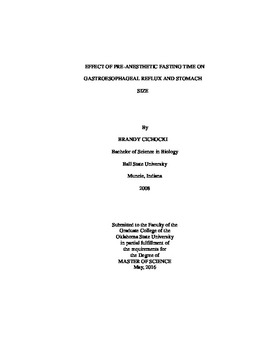| dc.contributor.advisor | Dugat, Danielle | |
| dc.contributor.author | Cichocki, Brandy | |
| dc.date.accessioned | 2017-02-22T22:14:05Z | |
| dc.date.available | 2017-02-22T22:14:05Z | |
| dc.date.issued | 2016-05-01 | |
| dc.identifier.uri | https://hdl.handle.net/11244/49058 | |
| dc.description.abstract | Many small animal patients at some point in their life will undergo general anesthesia. Gastroesophageal regurgitation (GER) is a complication that can be encountered during this time and could potentially lead to severe esophageal ulcers or stricture formation. To help reduce this risk, it has been recommended that patients not be fed for a specific period of time before their anesthesia. However, the best length of fasting time to reduce gastroesophageal regurgitation has been poorly identified. The effect of pre-anesthetic fasting time on the incidence of gastroesophageal regurgitation was evaluated. The null hypothesis states that pre-anesthetic fasting time will have no significant effect on the incidence of gastroesophageal regurgitation. Eight healthy, adult purpose-breed Beagles were randomly assigned to a fasting period of three, six, nine, or 12 hours. Following induction of anesthesia, esophagoscopy and abdominal radiographs were performed. A visual analog scale was used to determine the amount of ingesta present in the stomach, reported as a percentage representing stomach fullness. Esophageal pH and GER events were recorded using esophageal pH/impedance monitoring and endoscopic visualization of reflux. Recording for a GER event was performed for one hour. No premedication was utilized during the study. A wash out period of 14 days occurred between anesthetic episodes and all dogs rotated through each fasting treatment group once. Data was analyzed for acidity of reflux, time of reflux, evidence of esophageal pathology, and size of stomach. Our results failed to reject the null hypothesis. However, results did indicate that a shorter fasting time was significantly associated with a larger stomach size. For each 1% increase in stomach size, the odds that a dog would have a GER event increased by 17%. Results of this study indicate that stomach size, rather than pre-anesthetic fasting time, is directly associated with an increased risk of GER. | |
| dc.format | application/pdf | |
| dc.language | en_US | |
| dc.rights | Copyright is held by the author who has granted the Oklahoma State University Library the non-exclusive right to share this material in its institutional repository. Contact Digital Library Services at lib-dls@okstate.edu or 405-744-9161 for the permission policy on the use, reproduction or distribution of this material. | |
| dc.title | Effect of Pre-anesthestic Fasting Time on Gastroesophageal Reflux and Stomach Size | |
| dc.contributor.committeeMember | Lyon, Shane | |
| dc.contributor.committeeMember | Payton, Mark | |
| osu.filename | Cichocki_okstate_0664M_14516.pdf | |
| osu.accesstype | Open Access | |
| dc.description.department | Veterinary Biomedical Sciences | |
| dc.type.genre | Thesis | |
| dc.type.material | text | |
